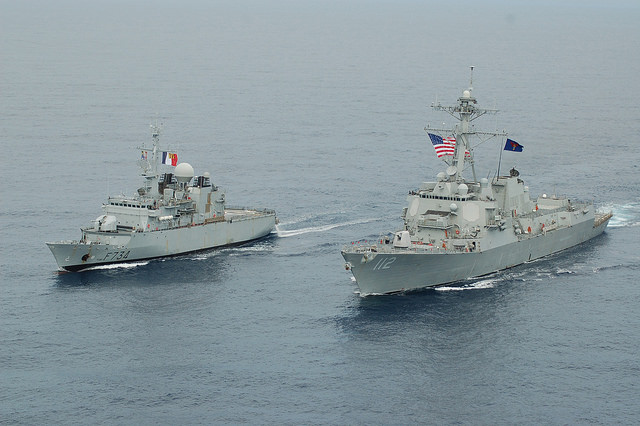France and security in the Asia–Pacific

France’s defence- and security-related activities in the Asia–Pacific are often underestimated, sometimes distorted or simply ignored. The natural focus on the role of major powers in the region—the US, China, India and Japan—causes the contribution of a strategic actor, considered first and foremost as European and therefore an outsider, to be overlooked; however, this actor exercises global power at the diplomatic, military and economic levels, including in the Asia–Pacific region.
The point here is not to overestimate France’s strategic role in the region, but merely to recognise that after its role was diminished at the end of the first Indochinese conflict, France became involved again strategically in the early 1990s—a movement that has expanded in recent years. This reflects a lasting strategic realignment that can be seen in French defence policy and more tangibly at the regional level in operations, cooperation and dialogue.
My ASPI report released today surveys France’s growing presence in the Asia–Pacific from the Indochina War and efforts to resolve the Cambodian conflict, through to the country’s 21st century contributions driven by strategic engagement related to globalisation, new threats, multilateral regional cooperation and increasingly interconnected strategic zones.
Over the past 25 years, France has shown that its regional defence commitment is serious, lasting and based on clearly identified strategic interests and solid, multifaceted bilateral cooperation. These relations continue to develop for the mutual benefit of France and its partners.
France offers them operational experience that’s quite exceptional for a medium-sized power, but one that’s engaged on every sea in the world, in operations in the Mediterranean, the Middle East, the Sahel, the Indian Ocean and the Gulf of Guinea. France’s involvement in several theatres of operations raises the profile of its defence cooperation internationally and increases interest in the training available in its military schools (which welcome around a hundred officers from Asia–Pacific countries every year).
France’s partners recognise its capacity for independent situational assessment, which contributes to its independent foreign security policy, mostly due to its highly efficient space capabilities. This strategic independence and the vast range of French defence capabilities are all assets recognised by its partners in the Asia–Pacific.
France has delivered approximately €30 billion worth of defence equipment across the Asia–Pacific in the past 25 years, making it a major provider to nations including India, Australia, Singapore, Malaysia and South Korea. It has also established productive technological and industrial partnerships with some of those countries, which in turn contribute to building up the defence capabilities, interoperability and strategic autonomy of France’s partners.
If the number of ministerial meetings is considered a pertinent indicator of the importance of France’s defence relationships, it’s worthwhile noting that the Minister of Defence, Jean-Yves Le Drian, had almost 120 meetings with his counterparts and senior political representatives from Asia–Pacific countries between mid-2012 and today. This is clear evidence of the sizeable role accorded to the Asia–Pacific in France’s strategic agenda.
The results of renewed French commitment to the region are significant, but that doesn’t mean that France is fully satisfied with the current situation. New bilateral cooperation opportunities open up every year, and France hopes to commit to them within its means and capabilities. Promising cooperation reinforcement opportunities are appearing on the horizon with major regional powers—in particular India, Japan and Australia—as well as with the US, with which regular consultations have been established at high level on the strategic context in the Asia–Pacific.
France also intends to pursue its commitment within multilateral security forums and has declared an interest in taking part in ASEAN Defence Ministers Meeting Plus activities, believing that this structure contributes pragmatically to the development of regional capacities to confront current and future security challenges and that France could provide a useful contribution.
Does France carry weight in the major strategic balance in the Asia–Pacific? The answer to this question is ‘No; not directly.’ But if the question is whether France contributes to regional security and to the development of defence and security capabilities in a large number of countries in the Asia–Pacific, then I believe that the answer is clearly a positive one. France doesn’t overestimate its strategic role in the Indo–Pacific region but considers it to be significant and appropriate and would like it to be better known. Its key defence partners in the region know what France does and appreciate its contribution, even if that can’t be said for the media and academia, despite their major role, by action or omission, in forming perceptions of political actors.